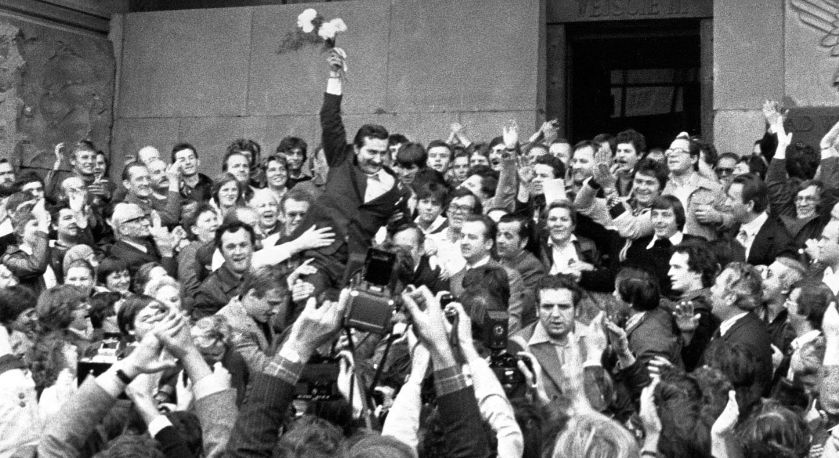Former Polish president and Nobel Peace Prize winner Lech Wałęsa, along with 38 other former political prisoners of Poland’s communist regime, has issued a scathing letter to US President Donald Trump following his recent meeting with Ukrainian President Volodymyr Zelensky.
“We watched your conversation with President Volodymyr Zelensky of Ukraine with horror and distaste,” the group wrote, comparing the atmosphere in the Oval Office to interrogations they experienced at the hands of communist security services.
The letter, signed by prominent figures from Poland’s anti-communist Solidarity movement, strongly criticizes Trump’s expectations of gratitude from Ukraine for US military aid, arguing that “gratitude is due to the heroic Ukrainian soldiers who shed blood in defense of the values of the free world.”
Full Translation of the Letter
Dear Mr. President,
We watched your conversation with President of Ukraine Volodymyr Zelensky with horror and distaste. We find your expectations regarding showing respect and gratitude for material aid provided by the United States to Ukraine fighting against Russia offensive. Gratitude is due to the heroic Ukrainian soldiers who shed blood in defense of the values of the free world. It is they who, for over 11 years, have been dying on the front lines in the name of these values and the independence of their Homeland attacked by Putin’s Russia.
We do not understand how the leader of a country that is a symbol of the free world cannot see this.
We were also horrified by the fact that the atmosphere in the Oval Office during this conversation reminded us of the one we remember well from interrogations by the Security Service and from courtrooms in communist courts.
Prosecutors and judges, commissioned by the all-powerful communist political police, also explained to us that they held all the cards, and we held none. They demanded that we cease our activities, arguing that thousands of innocent people were suffering because of us. They deprived us of freedom and civil rights because we refused to cooperate with the authorities and did not show them gratitude. We are shocked that you treated President Volodymyr Zelensky in a similar manner.
The history of the 20th century shows that each time the United States wanted to maintain distance from democratic values and its European allies, it ended in a threat to themselves.
President Woodrow Wilson understood this when he decided to bring the United States into World War I in 1917.
President Franklin Delano Roosevelt understood this when, after the attack on Pearl Harbor in December 1941, he decided that the war in defense of America would be fought not only in the Pacific but also in Europe, in alliance with states attacked by the Third Reich.
We remember that without President Ronald Reagan and American financial commitment, it would not have been possible to bring about the collapse of the Soviet Union empire. President Reagan was aware that millions of enslaved people suffered in Soviet Russia and the countries it conquered, including thousands of political prisoners who paid with their freedom for their sacrifice in defense of democratic values. His greatness lay, among other things, in the fact that he did not hesitate to call the USSR the “Evil Empire” and waged a decisive battle against it. We won, and a monument to President Ronald Reagan stands today in Warsaw opposite the US Embassy.
Mr. President, material aid – military and financial – cannot be an equivalent for blood shed in the name of the independence and freedom of Ukraine, Europe, and the entire free world. Human life is priceless; its value cannot be measured in money. Gratitude is due to those who sacrifice their blood and freedom. For us, the people of “Solidarity,” former political prisoners of the communist regime serving Soviet Russia, this is obvious.
We appeal for the United States to fulfill the guarantees it provided along with Great Britain in the Budapest Memorandum of 1994, which explicitly recorded a commitment to defend the inviolability of Ukraine’s borders in exchange for it giving up its nuclear weapons. These guarantees are unconditional: there is not a word about treating such assistance as an economic exchange.
Lech Wałęsa, former political prisoner, leader of Solidarity, president of the Third Polish Republic
[Followed by 38 additional signatories, all former political prisoners and Solidarity activists]Context
The letter comes in response to the tense meeting between President Trump and President Zelensky at the White House on Friday, where what was expected to be a signing of a minerals deal instead turned into a confrontational exchange. During this meeting, Trump and Vice President Vance reportedly expressed frustration with Ukraine, demanding more gratitude for US military assistance and pressuring Ukraine to make a deal with Russia.
The signatories of this letter – all former political prisoners under Poland’s communist regime – draw direct parallels between Trump’s treatment of Zelensky and their own experiences of intimidation by communist authorities. Their perspective carries particular weight given Poland’s historical experience with both Soviet domination and the successful struggle for freedom led by the Solidarity movement in the 1980s.
The letter also references the Budapest Memorandum of 1994, in which Ukraine gave up its nuclear arsenal in exchange for security guarantees from the United States, Russia, and the United Kingdom – commitments the signatories argue are “unconditional” and not contingent on expressions of gratitude.
Read also
-
“Meals remained untouched”: Trump orders Zelenskyy to leave White House after tense exchange
-
“Ukraine, you’ll never walk alone”: World leaders, officials respond to Trump-Zelenskyy talks collapse over security guarantees
-
The peace trap: Five ways Putin wins if Ukraine freezes the war
-
“Your minerals or your aid”: US holds Ukraine hostage while Russia bombs
-
Biden, Obama, Trump: Different presidents, same Russian reset trap




